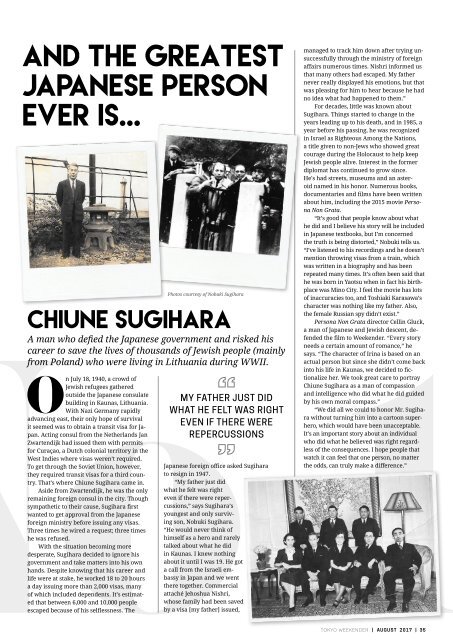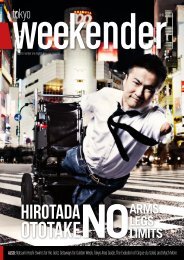Tokyo Weekender August 2017
Craving an island getaway? It's closer than you think... Plus: A Day in the Life of a Rickshaw Driver, Summer Cruises in Tokyo, and Who is the Greatest Japanese Person Ever?
Craving an island getaway? It's closer than you think... Plus: A Day in the Life of a Rickshaw Driver, Summer Cruises in Tokyo, and Who is the Greatest Japanese Person Ever?
You also want an ePaper? Increase the reach of your titles
YUMPU automatically turns print PDFs into web optimized ePapers that Google loves.
AND THE GREATEST<br />
JAPANESE PERSON<br />
EVER IS...<br />
On July 18, 1940, a crowd of<br />
Jewish refugees gathered<br />
outside the Japanese consulate<br />
building in Kaunas, Lithuania.<br />
With Nazi Germany rapidly<br />
advancing east, their only hope of survival<br />
it seemed was to obtain a transit visa for Japan.<br />
Acting consul from the Netherlands Jan<br />
Zwartendijk had issued them with permits<br />
for Curaçao, a Dutch colonial territory in the<br />
West Indies where visas weren’t required.<br />
To get through the Soviet Union, however,<br />
they required transit visas for a third country.<br />
That’s where Chiune Sugihara came in.<br />
Aside from Zwartendijk, he was the only<br />
remaining foreign consul in the city. Though<br />
sympathetic to their cause, Sugihara first<br />
wanted to get approval from the Japanese<br />
foreign ministry before issuing any visas.<br />
Three times he wired a request; three times<br />
he was refused.<br />
With the situation becoming more<br />
desperate, Sugihara decided to ignore his<br />
government and take matters into his own<br />
hands. Despite knowing that his career and<br />
life were at stake, he worked 18 to 20 hours<br />
a day issuing more than 2,000 visas, many<br />
of which included dependents. It’s estimated<br />
that between 6,000 and 10,000 people<br />
escaped because of his selflessness. The<br />
Photos courtesy of Nobuki Sugihara<br />
Chiune Sugihara<br />
A man who defied the Japanese government and risked his<br />
career to save the lives of thousands of Jewish people (mainly<br />
from Poland) who were living in Lithuania during WWII.<br />
MY FATHER JUST DID<br />
WHAT HE FELT WAS RIGHT<br />
EVEN IF THERE WERE<br />
REPERCUSSIONS<br />
Japanese foreign office asked Sugihara<br />
to resign in 1947.<br />
“My father just did<br />
what he felt was right<br />
even if there were repercussions,”<br />
says Sugihara’s<br />
youngest and only surviving<br />
son, Nobuki Sugihara.<br />
“He would never think of<br />
himself as a hero and rarely<br />
talked about what he did<br />
in Kaunas. I knew nothing<br />
about it until I was 19. He got<br />
a call from the Israeli embassy<br />
in Japan and we went<br />
there together. Commercial<br />
attaché Jehoshua Nishri,<br />
whose family had been saved<br />
by a visa [my father] issued,<br />
managed to track him down after trying unsuccessfully<br />
through the ministry of foreign<br />
affairs numerous times. Nishri informed us<br />
that many others had escaped. My father<br />
never really displayed his emotions, but that<br />
was pleasing for him to hear because he had<br />
no idea what had happened to them.”<br />
For decades, little was known about<br />
Sugihara. Things started to change in the<br />
years leading up to his death, and in 1985, a<br />
year before his passing, he was recognized<br />
in Israel as Righteous Among the Nations,<br />
a title given to non-Jews who showed great<br />
courage during the Holocaust to help keep<br />
Jewish people alive. Interest in the former<br />
diplomat has continued to grow since.<br />
He's had streets, museums and an asteroid<br />
named in his honor. Numerous books,<br />
documentaries and films have been written<br />
about him, including the 2015 movie Persona<br />
Non Grata.<br />
“It’s good that people know about what<br />
he did and I believe his story will be included<br />
in Japanese textbooks, but I’m concerned<br />
the truth is being distorted,” Nobuki tells us.<br />
“I’ve listened to his recordings and he doesn’t<br />
mention throwing visas from a train, which<br />
was written in a biography and has been<br />
repeated many times. It’s often been said that<br />
he was born in Yaotsu when in fact his birthplace<br />
was Mino City. I feel the movie has lots<br />
of inaccuracies too, and Toshiaki Karasawa’s<br />
character was nothing like my father. Also,<br />
the female Russian spy didn’t exist.”<br />
Persona Non Grata director Cellin Gluck,<br />
a man of Japanese and Jewish descent, defended<br />
the film to <strong>Weekender</strong>. “Every story<br />
needs a certain amount of romance,” he<br />
says. “The character of Irina is based on an<br />
actual person but since she didn’t come back<br />
into his life in Kaunas, we decided to fictionalize<br />
her. We took great care to portray<br />
Chiune Sugihara as a man of compassion<br />
and intelligence who did what he did guided<br />
by his own moral compass.”<br />
“We did all we could to honor Mr. Sugihara<br />
without turning him into a cartoon superhero,<br />
which would have been unacceptable.<br />
It’s an important story about an individual<br />
who did what he believed was right regardless<br />
of the consequences. I hope people that<br />
watch it can feel that one person, no matter<br />
the odds, can truly make a difference.”<br />
TOKYO WEEKENDER | AUGUST <strong>2017</strong> | 35
















